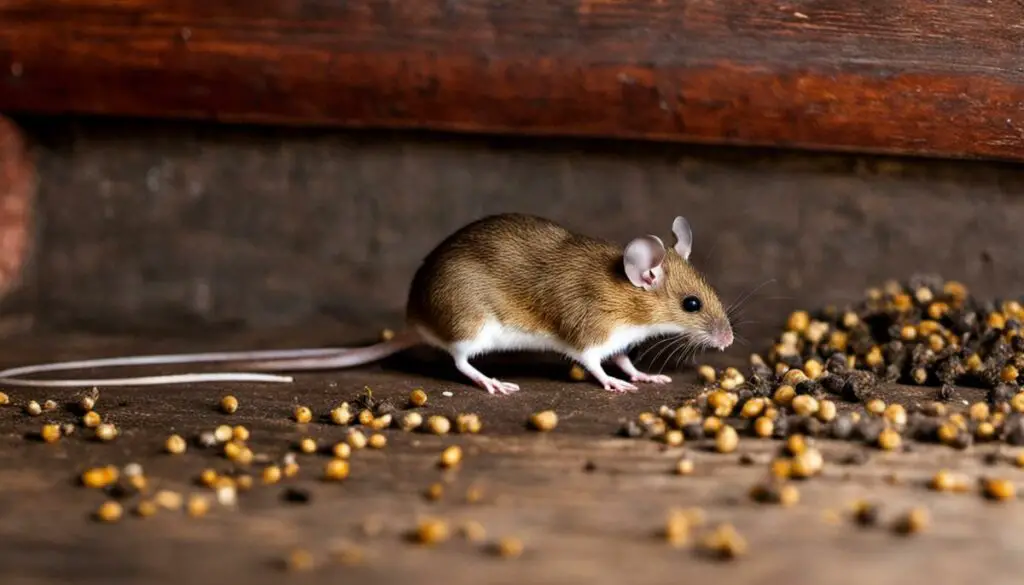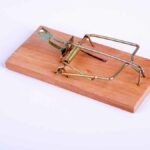If you’ve seen a mouse scurrying around your house or heard scratching noises in the walls, you might wonder if you have a mouse infestation. One of the most common signs of mice is droppings, but what if you haven’t found any? Don’t be fooled into thinking that no droppings means no mice. There are other signs you can look out for that indicate a rodent problem.

Gnaw marks are one of the most obvious signs of mice. Mice need to gnaw to keep their teeth from growing too long, so they will often chew on anything they can find, including wood, plastic, and even electrical wires. Look for small, fresh gnaw marks on baseboards, furniture, and other surfaces. If you find larger gnaw marks, you may have a rat problem instead.
Another sign of mice is urine stains. Mice urinate frequently and leave small, dark stains on surfaces they walk on. You may also notice a strong, musty odor in areas where mice are active. If you see any of these signs, it’s important to take action to get rid of the mice before they cause more damage or spread disease.
Signs of Mice But No Droppings – What Does That Mean?

Discovering signs of mice in your home can be unsettling, but finding signs of mice but no droppings can be even more puzzling. While mouse droppings are a common indication of a mouse infestation, their absence does not necessarily mean that there are no mice in your home.
There are several reasons why you may not see any droppings despite the presence of mice. One possibility is that the mice are not staying in one area long enough to leave droppings. Mice are known to move quickly and may only visit a certain area briefly before moving on to another location in your home.
Another possibility is that the mice are eating their droppings. While it may seem gross, mice will eat their feces to obtain nutrients that they did not absorb during digestion. This behavior is more common among young mice, but adult mice may also engage in it.
Additionally, mice may not leave droppings in areas that are frequently cleaned or disturbed. If you regularly clean your home, you may be inadvertently removing any droppings before you have a chance to see them.
Other signs of mice to look out for include gnaw marks on food packaging or other items, chewed wires, and strange noises such as scratching or scurrying sounds. If you notice any of these signs, it is important to take action to eliminate the mice from your home.
In conclusion, the absence of droppings does not necessarily mean that you do not have a mouse infestation. Keep an eye out for other signs of mice and take steps to eliminate them from your home.
Identifying Mouse Infestation
If you saw a mouse in your house but didn’t find any droppings, it doesn’t necessarily mean that you don’t have a mouse infestation. Mice are sneaky creatures that can easily hide in small spaces and avoid detection. Here are some signs that can help you identify a mouse infestation.
Physical Signs
One of the most obvious signs of a mouse infestation is gnaw marks. Mice have a constant need to gnaw on objects to keep their teeth sharp, so you may find gnaw marks on wood, plastic, or other materials. Gnaw marks are light when new and darker when they age, so finding newer gnaw marks indicates the continuing mouse infestation. If you find larger gnaw marks, you have a rat problem.
Another physical sign of a mouse infestation is footprints or mouse tracks. Mice leave footprints in dusty or dirty areas, so check your basement, attic, or other areas that are not frequently cleaned. You can also sprinkle flour or talcum powder on the floor to make the footprints more visible.
Auditory Clues
Mice are nocturnal creatures, so you may hear scratching noises in the walls or ceiling at night. These noises are caused by mice running, climbing, and gnawing on objects. You may also hear squeaking or rustling sounds, especially if there is a nest nearby.
If you suspect that you have a mouse infestation, you should also look for smudge marks or grease marks. Mice leave smudge marks on walls and baseboards as they run along them, and they leave grease marks on surfaces that they frequently touch.
Finally, you should check for holes in walls, floors, or ceilings. Mice can squeeze through very small spaces, so even a tiny hole can be an entry point for them. Check for holes around pipes, vents, and other openings.
In conclusion, if you saw a mouse in your house but didn’t find any droppings, it’s important to look for other signs of a mouse infestation. By identifying these signs early, you can take action to prevent a full-blown infestation and protect your home from damage.
Health Risks and Precautions

Health Hazards
Mice are known to carry diseases that can be transmitted to humans through contact with their urine, saliva, or feces. One such disease is Hantavirus, which can cause severe respiratory illness. If you notice signs of mice but no droppings, it is still important to take precautions to prevent exposure to these diseases.
In addition to Hantavirus, mice can also carry other harmful bacteria and viruses. These can cause a range of illnesses, from mild to severe. Some common symptoms of exposure to mouse-borne diseases include fever, headache, muscle aches, and fatigue. If you experience any of these symptoms, it is important to seek medical attention right away.
Clean Up Measures
Even if you don’t see any droppings, it is still important to clean up any areas where mice may have been present. This includes areas where you have seen mouse urine stains or evidence of nesting.
To clean up mouse urine and other waste, follow these steps:
- Put on rubber or plastic gloves
- Spray the area with a bleach solution or an EPA-registered disinfectant until it is very wet.
- Let the solution soak for at least 5 minutes.
- Use paper towels to wipe up the urine or droppings and cleaning products.
- Throw the paper towels in a covered trash can.
It is important to avoid sweeping or vacuuming mouse droppings, as this can cause the particles to become airborne and increase the risk of exposure. Instead, use a damp cloth to wipe up any droppings or debris.
To prevent future infestations, it is important to seal up any cracks or holes in your home where mice may be entering. This includes sealing gaps around doors and windows, as well as repairing any damaged screens or vents.
By taking these precautions, you can help protect yourself and your family from the health risks associated with mice and their waste.
Effective Mouse Control Methods

If you’ve seen a mouse in your house but no droppings, it’s important to take action to prevent an infestation. Here are some effective mouse control methods:
Trapping
One of the most effective ways to get rid of mice is by using traps. There are various types of mouse traps available, including snap traps, live traps, and glue traps. Snap traps are the most common and are easy to use. Simply bait the trap with peanut butter or cheese and place it in an area where you’ve seen mouse activity. Check the trap regularly and dispose of any caught mice.
Poisoning
Poisoning mice is another option, but it should be used with caution. Poison can be dangerous to pets and children, and it may take several days for the mice to die. If you choose to use poison, be sure to follow the instructions carefully and keep it out of reach of children and pets.
Professional Pest Control
If you have a severe infestation or prefer not to handle the problem yourself, consider hiring a professional pest control service. They have the experience and tools necessary to effectively eliminate mice from your home. They may also provide advice on how to prevent future infestations.
To prevent mice from entering your home in the first place, seal up any cracks or holes in your walls, floors, and foundation. Keep food in sealed containers, and clean up any spills or crumbs immediately. By taking these steps, you can help prevent a mouse infestation and keep your home pest-free.
FAQs

If you’ve noticed signs of mice in your home, but no droppings, you may have some questions. Here are a few FAQs to help you better understand the situation:
Why can’t I find any droppings?
While mouse droppings are a common sign of a mouse infestation, it’s not uncommon to find other signs without any droppings. Mice can be very sneaky and may not always leave droppings in plain sight. They may also be using a specific area of your home as a nesting place, which may not be where you’re seeing other signs of their presence.
Are there other signs of mice I should look for?
Yes, there are other signs of mice you should look for if you suspect an infestation. These include:
- Gnaw marks on food packaging or other materials
- Chewed wires or cables
- Squeaking or scratching noises
- Holes in walls or floors
Why do mice disappear?
Mice are very good at hiding and can disappear for a number of reasons. They may have found a new food source, moved to a different part of your home, or been scared off by a predator. If you’re not seeing any new signs of mice after a few days, it’s possible they may have left on their own.
What should I do if I find signs of mice but no droppings?
If you find signs of mice but no droppings, it’s important to take action to prevent a full-blown infestation. You should:
- Seal up any holes or cracks in your home where mice could enter
- Keep your home clean and free of clutter
- Store food in airtight containers
- Set traps or call a professional pest control company to help remove any mice that may be hiding in your home.
By taking these steps, you can help prevent a mouse infestation from getting out of control.








